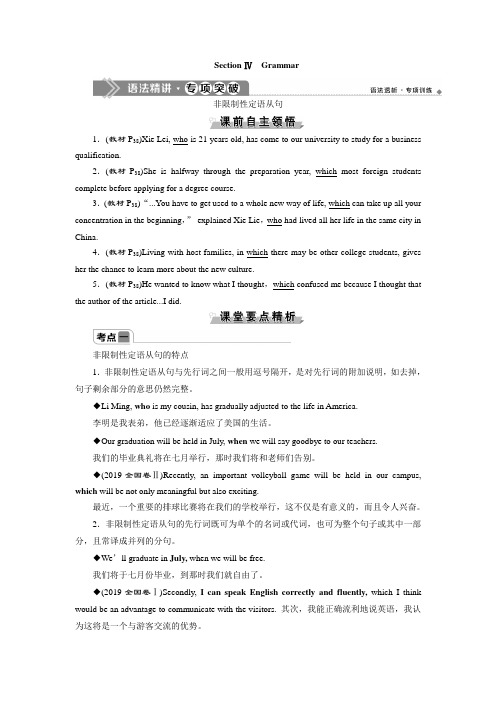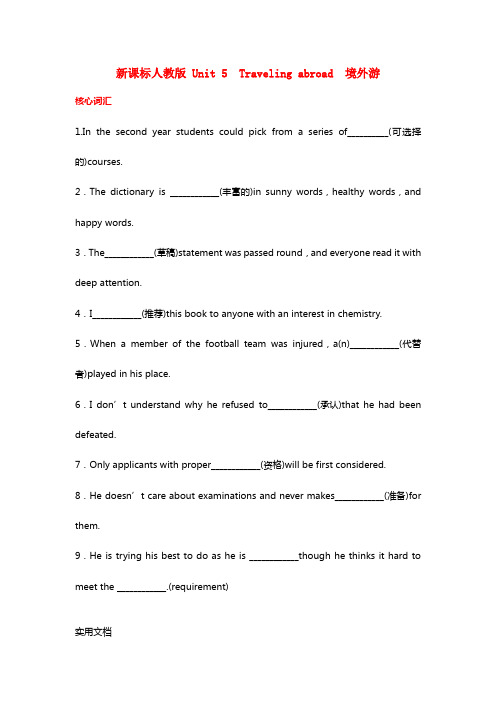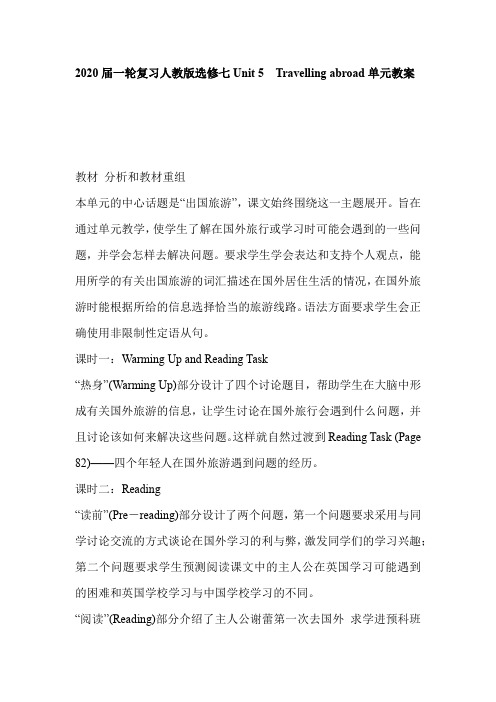2019-2020年新人教版选修七unit 5 《travelling abroad》教案3.doc
- 格式:doc
- 大小:60.88 KB
- 文档页数:6


Section ⅣGrammar非限制性定语从句1.(教材P38)Xie Lei, who is 21 years old, has come to our university to study for a business qualification.2.(教材P38)She is halfway through the preparation year, which most foreign students complete before applying for a degree course.3.(教材P38)“...You have to get used to a whole new way of life, which can take up all your concentration in the beginning,”explained Xie Lie,who had lived all her life in the same city in China.4.(教材P38)Living with host families, in which there may be other college students, gives her the chance to learn more about the new culture.5.(教材P38)He wanted to know what I thought,which confused me because I thought that the author of the article...I did.非限制性定语从句的特点1.非限制性定语从句与先行词之间一般用逗号隔开,是对先行词的附加说明,如去掉,句子剩余部分的意思仍然完整。
◆Li Ming, who is my cousin, has gradually adjusted to the life in America.李明是我表弟,他已经逐渐适应了美国的生活。

Unit5 Traveling aboard一.单词考点Section A Warming-up,Reading&Comprehending“适应,调节,调整”的用法1.adjust to介短语:adjust oneself to...使自己适应……eg:Astronauts in flight must adjust to weightlessness.区别:adjust,adapt⑴adjust宾语一般为具体事物。
⑵adapt指作大的改变或修改。
2.keep it up再接再厉;保持优秀成绩;继续做下去(it无意义,只用于构成固定短语)keep短语:keep up保持,跟上,不落后keep up with跟上;与……保持联系keep away from避开,不接近keep back扣住,留下,隐瞒不讲keep down控制;压制,镇压keep out挡住,使不进去keep off(使)不接近,(使)让开keep to坚持;遵守keep to oneself守口如瓶keep...from(doing)sth.阻止……(做)某事keep one’s word/promise履行诺言3.fit in“相适应;相合”“装得下;可以容纳”“与……相适应;与……相处融洽”“被接受;相处融洽”短语:fit in with sb.=get along/on with sb.与某人相处融洽fit in with sth.=agree with与……相符;与……相一致eg:①He explained the project to me and how my job fits in.②I tried to fit in,but they all much younger than I was.③I’ll come in your car,if you can fit me in.④She doesn’t fit in with the rest of the class.的用法4.preparationn⑴[U]预备,准备搭配:(be)in preparation在准备中in preparation for sth.为某事做好准备eg:His going abroad currently in preparation.⑵[C]安排,准备工作(常用复数)搭配:make preparations for sth.为某事做准备eg:As a senior Three student,I’m making preparations for the college entrance exam.5.recommend的用法vt⑴推荐,赞许搭配:recommend sb./sth.to sb.向某人推荐/介绍某人或某物recommend sb.for...推荐某人做(某职位)recommend sb.as...推荐某人为……eg:①We recommend him for the job.②Can you recommend a good teacher to my son?⑵劝告,建议搭配:recommend doing sth.建议做某事recommend sb.to do sth.建议某人做某事recommend sb.sth.(=recommend sth.to sb.)给某人介绍某物recommend that sb.should do sth.建议某人做某事eg:①He recommended to buy that book.②My father recommended us to go out for a walk.fort的用法⑴作n时,[C]“令人感到安慰的人或事物”eg:The child is a great comfort to her.⑵作n时,[U]“舒适,身体健康,安逸;安慰;慰藉”搭配:in comfort舒适地for comfort为了舒服give comfort to sb.安慰某人take/have/find comfort in sth.从……中得到安慰eg:They had enough money to live in comfort in their old age.⑶作vt时,“安慰(某人)”搭配:comfort sb.for sth.因某事安慰某人comfort sb.with sth.用……安慰某人eg:The letter from home comforted him.7.substitute的用法⑴作n时,“代替者,代用品”搭配:a substitute for sth.某物的代替品/者as a substitute作为代理人/代用品eg:Water is not a proper substitute for wine.⑵作v时,“用……代替……”(后接for)搭配:substitute A for B=substitute B with/by A用A代替Bsubstitute for sb./sth.代替某人/某物eg:I can substitute milk for cream.=I can substitute cream with/by milk.区别:substitute,replace⑴substitute指暂时代替或代理。

新课标人教版 Unit 5 Traveling abroad 境外游核心词汇1.In the second year students could pick from a series of__________(可选择的)courses.2.The dictionary is ____________(丰富的)in sunny words,healthy words,and happy words.3.The____________(草稿)statement was passed round,and everyone read it with deep attention.4.I____________(推荐)this book to anyone with an interest in chemistry. 5.When a member of the football team was injured,a(n)____________(代替者)played in his place.6.I don’t understand why he refused to____________(承认)that he had been defeated.7.Only applicants with proper____________(资格)will be first considered. 8.He doesn’t care about examinations and never makes____________(准备)for them.9.He is trying his best to do as he is ____________though he thinks it hard to meet the ____________.(requirement)实用文档10.用comfort的适当形式填空(1)Whenever he was upset,he would turn to her for____________and advice.(2)Were it not for science,we could not live a(n)____________life.(3)My husband thinks that we should save 18% of our income to live________in retirement.1.optional2.abundant3.draft4.recommend5.substitute6.acknowledge7.qualifications8.preparations9.required requirements 10.(1)comfort (2)comfortable (3)comfortably高频短语1.________________ 适应;调节2.________________ 保持优秀成绩;继续干下去3.________________ 相适应;相融合4.________________ 就……而言5.________________ 忙着做……;忙于某事物6.________________ 日复一日7.________________ 不可能的;不值得讨论的8.________________ (迁入新居、更换工作后)安顿下来实用文档9.________________ 对……适应;习惯10.________________ 占用时间;占据空间;继续1.adjust to2.keep it up3.fit in4.as far as one is concerned5.be occupied with6.day in and day out7.out of the question8.settle in9.get/be used to 10.take up重点句式1.It was the first time she __________________her motherland.这是她第一次离开自己的祖国。

Unit 5Travelling abroad[单词拼写应用]核心单词1.queue n.队列;行列v i.排队2.lecture n.& v i.演讲;讲课3.acknowledge v t.承认;确认;答谢4.routine n.常规;日常事务adj.通常的;例行的5.optional adj.可选择的;随意的6.destination n.目的地7.preparation n.准备;预备8.idiom n.习语;成语9.motherland n.祖国10.substitute n.代替者;代用品v t.用……代替……[语境运用]用所给词的适当形式填空。
1.It is acknowledged (acknowledge) that wealth doesn't necessarily mean happiness. 2.They are queuing(queue) up for the tickets to see the new film now.3.We have made all necessary preparations (preparation) for the research project,which still has many problems to be solved.4.Robots have been substituted (substitute)for human beings in doing some dangerous work up to now.5.No dictionaries can cover all the English idioms (idiom).拓展单词1.comfort n.舒适;安慰v t.安慰→comfortable adj.舒适的→comfortably ad v.舒适地2.revise v t.复查;修正;复习→revision n.复查;修正;复习3.qualify v t. (使)合格;(使)具有资格→qualified adj.有资格的;能胜任的→qualification n.资格;资历4.require v t.需要;要求→requirement n.需要;要求5.govern v t.& v i.统治;支配;管理→government n.政府6.apology n.道歉;谢罪→apologize v i.道歉7.abundant adj.丰富的;充裕的→abundance n.丰富;充裕8.recommend v t.推荐;建议→recommendation n.推荐;建议9.occupy v t.占用;占领;占据→occupation n.工作;占领10.agent n.代理人;经纪人→agency n.代理;中介[语境运用]用所给词的适当形式填空。

2020届一轮复习人教版选修七Unit 5Travelling abroad单元教案教材分析和教材重组本单元的中心话题是“出国旅游”,课文始终围绕这一主题展开。
旨在通过单元教学,使学生了解在国外旅行或学习时可能会遇到的一些问题,并学会怎样去解决问题。
要求学生学会表达和支持个人观点,能用所学的有关出国旅游的词汇描述在国外居住生活的情况,在国外旅游时能根据所给的信息选择恰当的旅游线路。
语法方面要求学生会正确使用非限制性定语从句。
课时一:Warming Up and Reading Task“热身”(Warming Up)部分设计了四个讨论题目,帮助学生在大脑中形成有关国外旅游的信息,让学生讨论在国外旅行会遇到什么问题,并且讨论该如何来解决这些问题。
这样就自然过渡到Reading Task (Page 82)——四个年轻人在国外旅游遇到问题的经历。
课时二:Reading“读前”(Pre-reading)部分设计了两个问题,第一个问题要求采用与同学讨论交流的方式谈论在国外学习的利与弊,激发同学们的学习兴趣;第二个问题要求学生预测阅读课文中的主人公在英国学习可能遇到的困难和英国学校学习与中国学校学习的不同。
“阅读”(Reading)部分介绍了主人公谢蕾第一次去国外求学进预科班时所面临的问题,以及房东和导师对她的帮助,要求学生明白国外学习的利与弊,培养正视困难、迎接挑战的信心。
课时三:Grammar (语法复习课)本单元的语法重点是复习非限制性定语从句(Non-restrictive Attributive Clause)。
学生已经学过这个语法点,所以在这节课中,首先对非限制性定语从句的特征、关系词做一个简要回顾,然后通过多种形式的练习,如填写关系词、造句和改错等,使学生逐步掌握非限制性定语从句的用法。
这些教学环节,如开始部分的欣赏范文、找出好句的活动和结束部分的写作练习,都充分体现了在语境中学习语法、在语境中运用语法的教学原则。
高中英语选修7 Unit5 Travelling Abroad一.教学内容人教版高中英语选修7 第五单元(Travelling Abroad)二. 教材分析本单元以Travelling abroad and studying abroad为话题,旨在通过单元教学,使学生获得旅游、旅居国外方面的通用知识,开阔眼界,以及旅游方面的英语表达。
使学生了解在国外旅行或学习时可能会遇到的一些问题,并学会怎样去解决问题和避免这些问题的发生。
学会表达个人观点,能用所学的有关travelling abroad的词汇描述在国外居住生活的情况。
本节课主要是通过“warming-up & pre-reading”部分的学习,使学生了解了在国外学习生活时可能面临的困难以及怎样解决这些困难。
Warming Up让学生说说想去哪个国家去旅游或学习并用已有的知识和经验讨论在国外学习或旅行会遇到什么问题。
Pre-reading是Reading 的热身活动,要求学生采用与同学讨论交流的方式谈论在国外学习的利与弊,为正文的阅读做好知识上和心理上的铺垫。
Reading是一篇介绍中国女孩谢蕾在伦敦学习和生活的情况,让学生通过实例对比在国内学习生活与在国外学习生活的不同,从而培养他们的国际视眼。
三、学情分析1.情感和认知方面:学生对国外的学习生活情况了解是很感兴趣的。
在以往的学习阅读中对国外的生活学习也有所了解,但不是很具体。
这篇关于中国女孩在伦敦学习和生活情况的介绍和他们的生活比较贴近,在在预读,学习,讨论时会觉得比较亲近熟悉。
2.语言技能方面:我校大部分学生英语语言能力比较若,在思维上相对有较强的独立性,通过老师的引导和提示,一般能够从的文字资料中获取主要信息和基本的内容,能根据阅读目的运用适当的阅读策略完成阅读任务。
但一些学生的分析信息和处理信息的能力还欠缺,尤其是归纳总结能力。
四、教学目标1. Knowledge aims: Duide the students to master the first part of the words and phrases related to the topic, including "lecture, qualification, recommend, comfort, substitute, acknowledge, as far as one is concerned, be occupied with, keep it up, fit in ... and etc.2. Ability aims: Enable the students to learn about the information of travelling abroad, working or studying abroad by using different reading skills. Enable the students to summarize the advantages and the disadvantages of living or studying in a foreign country.3. Emotional aims: Help the students learn about the differences and difficulties of living and studying in a foreign country and learn how to deal with the problems that they would face when studying in a foreign country.五、教学重点及难点1. Widen the vocabulary range. Develop the students’reading skills namely skimming and scanning and so on.2. Guide the students to summarize the benefits and difficulties of living in a foreign country.六. 教学方法1.演示法:通过相关的图片、PPT等网络多媒体辅助显示给学生看,便于学生对基础知识和背景知识的把握,并从旧知识中获得启迪,从而达到解决问题的目的。
Ⅰ品句填词1.We finally arrived at our destination(目的地), tired and hungry.2.I chose this university because of its strong cultural atmosphere as well as its high academic(学术的) status.3.There is no fixed routine(日常事务) at work—every day is different.4.The agent(经纪人) of the famous singer came up and stopped the reporters from taking pictures.5.Mary took three optional(选修的) courses last semester.6.The country is governed(管理) by elected represen-tatives of the people.7.He made an apology(道歉) to me for hurting my feelings.8.There is abundant(充足的) evidence that cars have a harmful effect on the environment.9.When the red light comes on, you should recharge the battery(电池) so it is ready for the next time.10.The old man wants to buy a cage(鸟笼) for birds.Ⅱ选词填空apply for; adjust to; day in and day out; keep it up; fit in; settle in; out of the question; take up 1.After graduating from university, Emily applied__for a post as an editor that she was suited for.2.It is a little difficult for the students of Senior Two to adjust__to the new educational system.3.Staying with her friends took__up most of her time, so Anna could hardly have any time to study.4.It is the first time Helen has come to my house. I’m not sure if she can fit__in with my family.5.For a whole year, Rose has been working day__in__and__day__out,__without a holiday for relaxation.6.If the girl doesn’t control her diet, losing weight is out__of__the__question.7.You can come and visit our new apartment after we settle__in.8.We are tired, but we keep__it__up with remarkable enthusiasm.Ⅲ完成句子1.我们安顿下来后,我将邀请我的父母和我们一起住新房子。
课后限时作业(十四)(见课时作业P27)Ⅰ.单句语法填空(建议用时:7分钟)1.In 1963 the UN set up the World Food Programme, one of whose purposes is to relieve worldwide starvation.解析purposes 与the World Food Programme存在所属关系,且空处在句中作定语,故填whose。
2.A clean environment can help the city bid for the World Expo, which in turn will promote its economic development.解析空处引导非限制性定语从句,指代前面一句话的内容,且在从句中作主语,故填which。
3. She lives in a small village, which is only three miles from here.解析句意:她住在一个小村庄,离这儿只有三英里远。
4.She is going to spend the summer holidays in Shanghai, where she has some friends.解析句意:她打算去上海过暑假,在那里她有一些朋友。
5.We'll put off the meeting till next week, when we won't be so busy.解析句意:我们将把会议推迟到下周,那时我们不会太忙。
6.The sun gives the earth light and heat, which is very important to the living things.解析句意:太阳给地球光和热,这对生物是非常重要的。
7.The ship, on which the Europeans sailed to the American continent, was called the Mayflower.解析句意:欧洲人航行到美洲大陆所乘坐的船叫“五月花”号。
Period 3 Grammar教学目标1.语言知识目标:复习非限制性定语从句的特点和关系词2.语言能力目标:能够写出含有非限制性定语从句的句子,并在书面表达中进行运用重点难点1.教学重点:掌握非限制性定语从句的特点,关系代词和关系副词使用的场合;能够运用非限制性定语从句。
2.教学难点:关系代词和关系副词使用的场合;在写作中运用非限制性定语从句;明确限制性定语从句与非限制性定语从句的区别。
教学准备1.学生的学习准备:复习非限制性定语从句的特点及关系词。
2.教师的教学准备:整理关系代词和关系副词的使用场合,并设计合理的场景。
3.教学用具的设计和准备:制作多媒体课件。
教学过程Step 1Presentation1.Enjoy a beautiful composition which comes from the 2008 Zhejiang college entrance examination.I prefer my English classes to be taught in both English and Chinese,whose_advantage_is_that_it_is_easy_for_us_to_understand_what_th e_teacher_talks_about.The teacher first teaches the class in English,and then she explains those that_are_hard_to_understand_to_us so that we get a better understanding of the passage.That will be good for us.However,teaching the class in two languages will make the English atmosphere not so strong.Some students who_wish_to_be_taught_in_English_will be disappointed.Except for the disadvantage,I think it is really good to hear two languages in class.It can make us more familiar with the foreign culture.2.Show the sentences with the restrictive and non-restrictive attributive clauses in the composition on the screen.[设计说明] 欣赏高考满分范文,找出美丽的句子,能够很快地引起学生的兴趣,活跃课堂气氛,而且带有限制性定语从句和非限制性定语从句的出彩句子的出现,也为复习定语从句做好了准备。
Period 3Grammar教学目标1.语言知识目标:复习非限制性定语从句的特点和关系词2.语言能力目标:能够写出含有非限制性定语从句的句子,并在书面表达中进行运用重点难点1.教学重点:掌握非限制性定语从句的特点,关系代词和关系副词使用的场合;能够运用非限制性定语从句。
2.教学难点:关系代词和关系副词使用的场合;在写作中运用非限制性定语从句;明确限制性定语从句与非限制性定语从句的区别。
教学准备1.学生的学习准备:复习非限制性定语从句的特点及关系词。
2.教师的教学准备:整理关系代词和关系副词的使用场合,并设计合理的场景。
3.教学用具的设计和准备:制作多媒体课件。
教学过程Presentation1.Enjoy a beautiful composition which comes from the 2008 Zhejiang college entrance examination.I prefer my English classes to be taught in both English and Chinese,whose_advantage_is_that_it_is_easy_for_us_to_understand_what_the_teacher_tal ks_about.The teacher first teaches the class in English,and then she explains those that_are_hard_to_understand_to_us so that we get a better understanding of the passage.That will be good for us.However,teaching the class in two languages will make the English atmosphere not so strong.Some students who_wish_to_be_taught_in_English_will be disappointed.Except for the disadvantage,I think it is really good to hear two languages in class.It can make us more familiar with the foreign culture.2.Show the sentences with the restrictive and non-restrictive attributive clauses in the composition on the screen.[设计说明] 欣赏高考满分范文,找出美丽的句子,能够很快地引起学生的兴趣,活跃课堂气氛,而且带有限制性定语从句和非限制性定语从句的出彩句子的出现,也为复习定语从句做好了准备。
Revision1.Revise the characteristics of non-restrictive attributive clauses.(The students can say that in Chinese.)从形式上看,非限制性定语从句与先行词(被定语从句修饰的名词或代词)之间有逗号。
从功能上看,非限制性定语从句对先行词起着补充说明的作用,如果去掉从句,不会影响到整个主句的意思。
Revise the differences between restrictive and non-restrictive attributive clauses.从形式上看,限制性定语从句与先行词(被定语从句修饰的名词或代词)之间没有逗号。
从功能上看,限制性定语从句对先行词起着限制解释的作用,如果去掉从句,会影响到整个主句的意思。
2.Revise the usage of non-restrictive attributive clauses.引导非限制性定语从句的关系代词有as,which,who, whom,whose等,作定语从句的主语、宾语、表语及定语。
关系副词有when,where等,作定语从句的状语。
关系代词和关系副词在定语从句中一般不能省略。
(1)which引导的非限制性定语从句来说明前面整个句子的情况或主句的某一部分,that不能用于引导非限制性定语从句。
例如:Her house,which was built a hundred years ago,stood still in the earthquake.(2)当先行词是专有名词或被物主代词和指示代词所修饰时,其后的定语从句通常是非限制性的。
例如:Charles Smith,who was my former teacher,retired last year.(3)as,which引导指代主句内容的非限制性定语从句时,表依据、评论与表事实、状态等没有多大差别,用在主句末时,有时可以通用。
He is quite pleased,as /which can be seen from his face。
但是,上面句中把定语从句置于主句句首时,就只能用as。
(4)“n./pron./num.+prep.+which”定语从句China has thousands of islands,the largest of which is Taiwan.[设计说明] 借助第一环节中的句子,先让学生找出限制和非限制性定语从句,再复习非限制性定语从句的特征,区分与限制性定语从句的不同,为下面的环节——非限制性定语从句的运用打下基础。
PracticingSince the students have known the differences between restrictive attributive clauses and non-restrictive attributive clauses,let them do some practice.1.(1)A fast food restaurant is the place ______,just as the man suggests,eating is performed quickly.A.which B.where C.there D.what(2)York,______ last year,is a nice old city.A.that I visited B.which I visited C.where I visited D.in which I visited(3)Anyway,that evening,______ I'll tell you more about later,I ended up staying at Rachle's place.A.when B.where C.what D.which(4)Recently I bought an ancient Chinese vase,______ was very reasonable.A.which price B.the price of whichC.its price D.the price of whose(5)The journey around the world took the old sailor nine months,______ the sailing time was 226 days.A.of which B.during which C.from which D.for whichKeys:(1)B(2)B(3)D(4)B(5)A2.Fill in the blanks with the proper relative pronouns/adverbs.(1)That tree,______ branches are almost bare,is very old.(2)I'm taking some weight-loss pills,______ are quite popular here.(3)Jim changed his mind,______ made me very angry.(4)After living in Paris for fifty years he returned to the small town,______ he grew up as a child.(5)I have many friends,some of ______ are businessmen.(6)Madam Curie,for ______ life had been very hard early in her life,was the first person in the world to receive two Nobel Prizes.(7)______is known to everybody,the moon travels round the earth once every month.(8)We will be shown around the city:schools,museums,and some other places,______other visitors seldom go.Keys:(1)whose(2)which(3)which(4)where(5)whom(6)whom(7)As (8)where3.Complete the sentences with your own words.(1)Painting is a popular activity,which ____________.(2)Jack,who ____________,hated the idea of traveling to Scotland on the train.(3)He must be from Africa,where ____________.(4)My father was born on October 1,1949,when ____________.(5)The sun heats the earth,which ____________.(6)She got a gift from her mother,whom ____________.(7)He was educated at a local grammar school,after which ____________.(8)I gave him a warning,to which ____________.答案:略4.Join the two sentences. You need to add commas to most.(Exercise 3 on Page 41)Keys:(1)Peter,who people used to think was quiet,danced and sang all evening.(2)For my birthday,Sharon gave me a picture she had painted especially for me.(3)The operation,which improved my grandfather's hearing,was performed ina famous hospital.(4)I saw many historical sites when I went on a tour round China,which was very exciting.(5)The two traffic accidents happened on the same morning,when there was a heavy fog.(6)Tang Ling volunteered to help the welfare house,where she teaches the homeless children.(7)As far as I'm concerned,Anne,whose daughter is in my class,should not be going to America next year.(8)He went on a bus tour with a group of people,most of whom had never traveled before.5.Write a passage about your hobbies using non-restricitive attributive clauses properly.[设计说明]语法运用在这个部分是层层递进的。